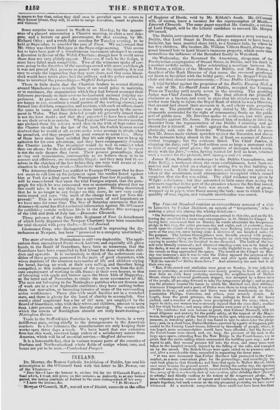Some surprise was caused in Sheffield on Monday, by the
appear- ance of a placard announcing a Chartist meeting, to elect a new dele- gate, and a lecture on good government, for that evening, by Mr. Richard Otley ; and a torch-light meeting for Tuesday evening, to be held at Skye-edge, to consider the case of Frost. We understand that Mr. Otley was elected Delegate at the Skye-edge meeting. This seems but to have been part of a simultaneous movement attempted to create a diversion in favour of the Welsh Chartists; though how it could serve them does not very plainly appear. However, if such be the design, it must have failed most completely. Two of the witnesses spoke of per- sons going in the direction of the meetings armed with guns; and though it was not proved that persons so armed were at the meeting, it is not easy to evade the impression that they were there, and that some blood- shed would have taken place had the military and the police arrived in time to interrupt the proceedings.—Sheffletd Independent.
There is little cloubt that the Chartists leaders in several districts around Manchester have recently been at no small pains to maintain, or to reanimate, the organization which they had formed amongst their followers previously to their ever-to-be-lamented national holyday ex- periment. At present those who yet remain with them, (but who, we are happy to say, constitute a small portion of the working classes,) are formed into districts, companies, and sections, with each an officer, much the same in name and functions as those lately exposed by the move- ment in Wales. That these deluded people are generally armed there is not the least doubt ; and that they expected to have been called on to. use their arms is as certain. When Feargus O'Connor twelve months ago pledged them his solemn word that on the 29th of September last the Charter should he the law of the land, his fbolish hearers never doubted that he would at all events make some attempt to obtain what he promised, and they prepared in good earnest to assist him. Many of them have since been satisfied that his sole object was to keep up agitation for his own advantage, and they have consequently deserted the Chartist ranks. The remainder would do well to consider what therare about; for the risk of military execution like that at Newport is notthe only danger they incur. Their present proceedings, their arming and organization, contemptible as we believe them to be in amount and efficiency, are thoroughly ; and they may find them- selves in the clutches of the law before they are very well aware of the situation in which they stand.—Manchester Guardian.
The Attorney-General has notified to Feargus O'Connor that. he does not mean to call him up for judgment upon the verdict found against him at York for a libel upon the Warminster Poor-law G aardians. It will be remembered that upon the trial Feargus argued, that the para- graph for which he was prosecuted was so monstrously absurd that no One Could take it for any thing but a mere joke. Having discovered that he is no longer in any danger on this score, he now very coolly turns round and says, "the truth of the charge has not yet been dis- proved!" This is certainly as fine a specimen of cool impudence as we have seen for some time. The Slur of Saturday announces that the Attorney-General has filed a criminal information against Mr. O'Connor for publishing certain seditious libels in the Northern Star newspaper of the 13th and 20th of July last. —Doncaster Chronicle.
Three privates of the Forty-fifth Regiment of Foot (a detachment of which lately dispersed the Newport Chartists) have been committed for trial charged with petty thefts.—Bristol Journal.
s Lieutenant Gray, who distinguished himself in repressing the dis- turbances at Nee/port, has been " promoted to a company unattached."


























 Previous page
Previous page